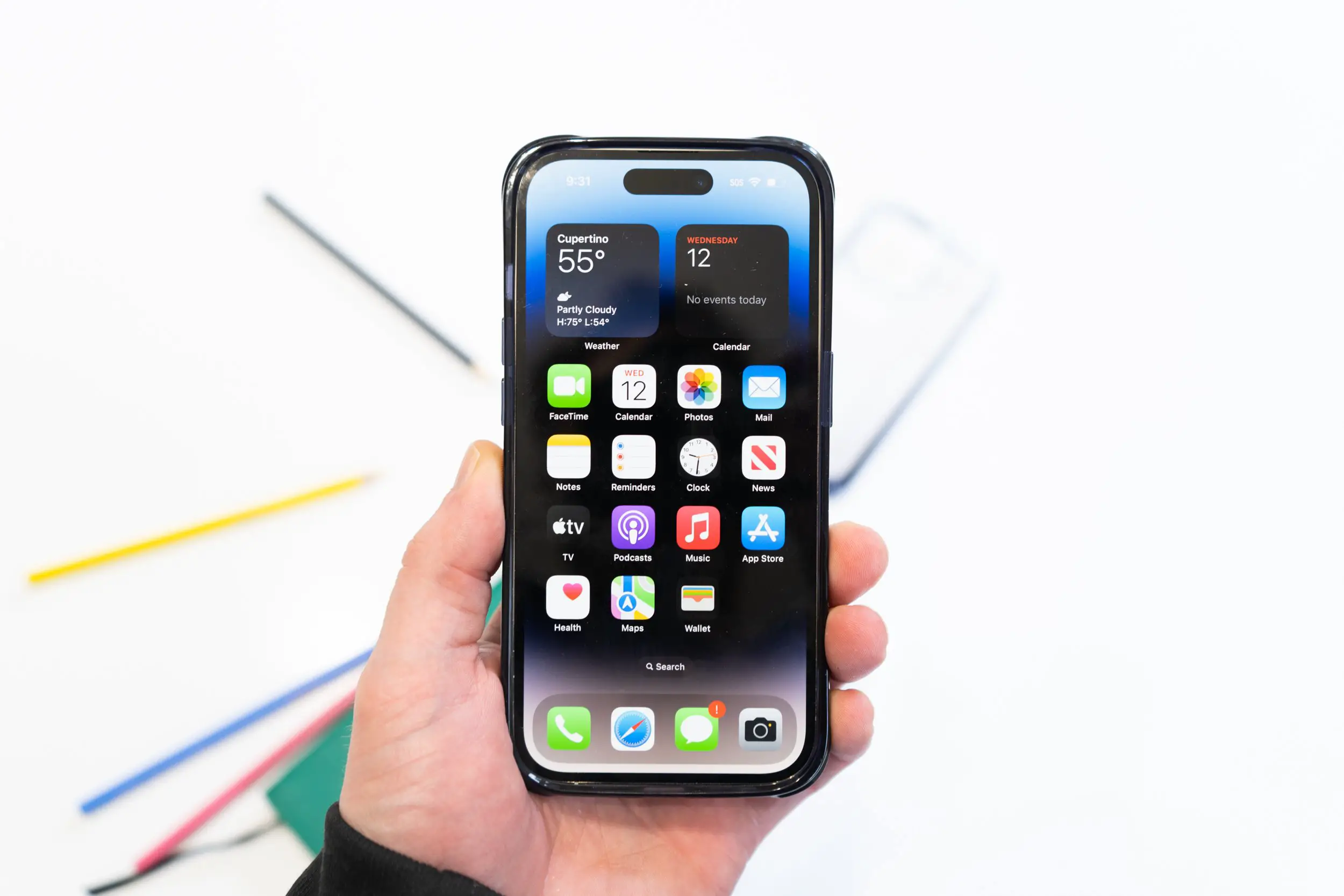
As it stands, many companies rely heavily on Qualcomm for a lot of their components for their smartphones and tablets. The most obvious would be the chipset that powers our phones, then there is also the GPU, and also the modem.
Now, Apple was reported to be trying to build its own 5G modem in a bid to reduce their reliance on Qualcomm, but that effort seems to have failed as there are multiple reports claiming that Apple is apparently calling it quits on their custom 5G modem development. This is according to a post by "yeux1122" on Naver, as well as a post on X by @Tech_Reve.
While none of this has been confirmed, it does lineup with earlier reports in which it was suggested that Apple was running into various issues and hurdles during the development process. It seems that whatever prototypes Apple developed were far behind whatever was already commercially available, not to mention there were issues with the Intel code Apple had inherited when they bought over Intel's smartphone modem business.
It is unclear if Apple will attempt to pick this up again later on. The company is notorious for trying to do everything in-house where possible, and while they've had quite a bit of success with that, it looks like this 5G modem will have to be chalked up as a loss, at least for now.

Not all tipsters are right every time they post on "X," Weibo, or whichever platform they use. Take tipster Majin Bu, whose tips and leaks we've passed along from time to time. A few days ago he posted a tweet (via AppleInsider) that included some information about the upcoming iPad Pro line that he says he was told about.
The tweet says that we could see three iPad Pro models next year with two of them equipped with OLED panels. The 11-inch and 12.9-inch models will be the first iPads ever to sport an OLED display. This part of the tip seems legit as it is a rumor that has been around for some time. But Majin Bu says that he was also told about a third model that will feature a 14.1-inch mini-LED display.
A mini-LED display iPad Pro screen offers many of the same features that an OLED iPad Pro screen does
The mini-LED backlighting allows a display to be as close to OLED as possible without the expense. With mini-LED, the display is brighter and the contrast ratio can be as high as 1,000,000:1. These screens also show deeper blacks and there is no risk of screen burn-in as there is with OLED. The current 12.9-inch iPad Pro sports a mini-LED screen.
On the other hand, the tipster might not be way off on the possibility of a third iPad Pro with a 14.1-inch micro-LED screen. In 2022, according to the highly accurate co-founder and CEO of Display Supply Chain Consultants (DSCC) Ross Young, Apple was working on a 14.1-inch iPad Pro model for 2023 although there have been no new iPad models this year and such a tablet could easily have been pushed back to 2024.
All three new iPad Pro models for 2024 will be powered by the new powerful and energy-efficient M3 SoC
Majin Bu also said in his tweet that all three iPad Pro models will be powered by the powerful and new M3 chip with 8GB RAM. The displays will each deliver up to 3000 nits of brightness and the tablets will support a new Apple Pencil with interchangeable magnetic tips (for drawing, technical drawing, and painting). He also expects Apple to introduce a new aluminum Magic Keyboard for the top-of-the-line tablets with two USB-C ports and somehow MagSafe would be used to connect to the tablets instead of using a Smart Connector.
Additionally, there would be a "software only" Dynamic Island on the new iPad Pro (2024) tablets. The latter isn't needed to hide the True-Depth Camera on the iPad Pro as it is on the iPhone. In his tweet, the tipster is already covering his tracks by writing, "I'm not sure of the source so I can't take this information too seriously but I think it's okay to report it anyway." Right now the Dynamic Island can be found only on the iPhone 15, iPhone 15 Plus, iPhone 15 Pro, iPhone 15 Pro Max, iPhone 14 Pro and the iPhone 14 Pro Max.
This year is the first time in the history of the iPad that Apple did not introduce new or refreshed versions of the tablets which means we should expect to see Apple make up for lost time next year.
The iPad Pro, according to TF International analyst Ming-Chi Kuo, will start mass production late in the first quarter or during the second quarter of 2024. Majin Bu does say to expect thinner bezels on all three iPad Pro (2024) models.
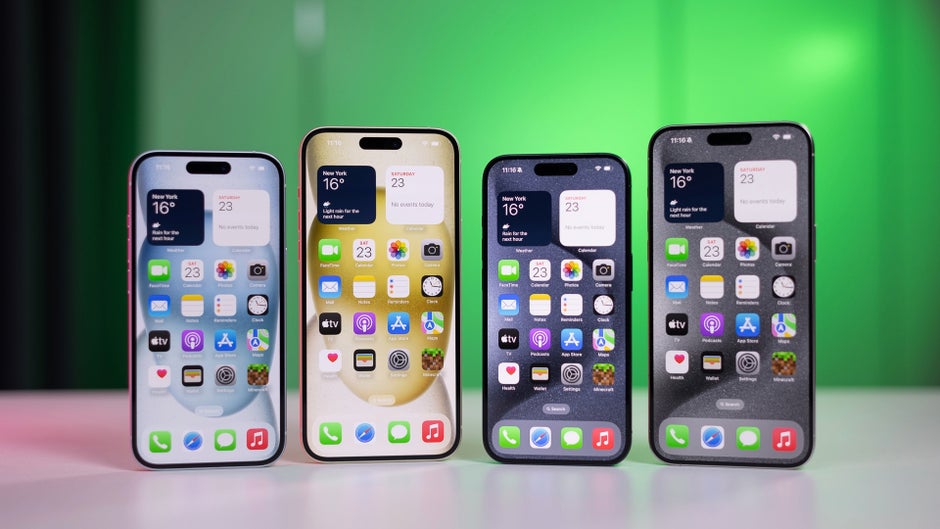
Ever wished for a bit more privacy while using your smartphone? Yes? Well, Apple seems to be working on making that happen with some innovative screen technology. Recent report from Apple Insider reveals two granted patents shedding light on the tech giant's efforts to enhance iPhone screen privacy.
The two options that Apple is researching are using a privacy film layer over the screen and displays with adjustable angles of view.
The first patent, "Privacy films for curved displays," explores the possibility of adding a privacy film layer to the screen. This film acts like a polarizing filter, allowing light to emit in only one direction. When viewed from the right spot, users experience full brightness and the quality of the retina display.
While similar film layers exist in the market, and you can add one to your smartphone display, they prove to be somewhat limited as visibility is restricted to a single point. This can pose challenges not only for onlookers but also for the device user.
While anyone trying to view the screen from an angle will see a blurry or completely obscured image, this film layer does not provide complete privacy, as anyone standing directly behind the user will still be able to see the screen.
Moving on to the second patent, "Displays with adjustable angles of view," Apple takes a subtler approach by proposing alterations to the viewing angle of the display.
According to the patent, in a private viewing mode, the control circuitry applies a current to electrodes, causing the electrochromic material to become more opaque, thereby limiting the display's angle of view. Essentially, this patent introduces an "electrically controllable filter" within the display, giving users control over screen polarization.
Unlike the first approach with an external film layer, this second method integrates privacy features directly into the display itself. The display, comprising a series of substrate layers, could include an additional layer of liquid crystal. This liquid crystal element might incorporate a color filter, enabling users to limit certain colored images to their eyes only.
These patents hint at Apple's ongoing efforts to enhance user privacy without compromising display quality. As technology continues to evolve, it will be interesting to see how these innovations shape the future of smartphone displays.
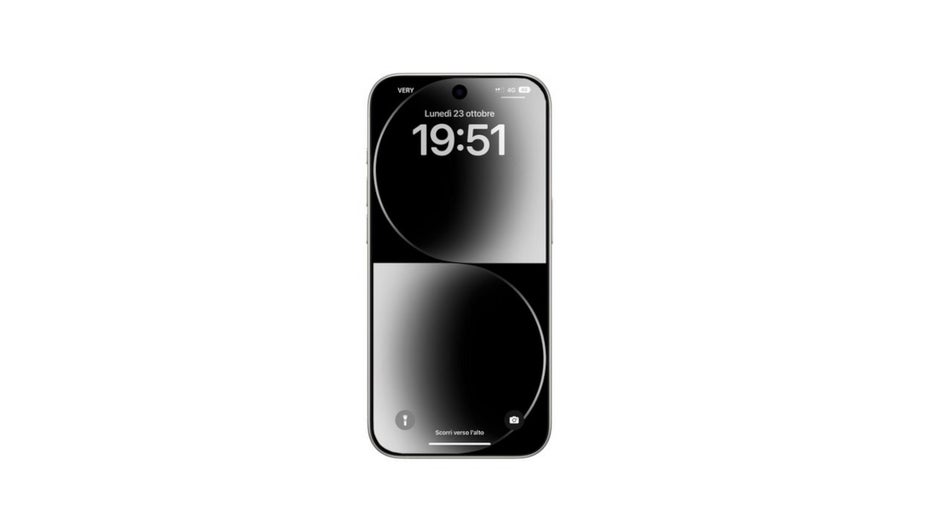
The iPhone 15 series hasn't been out for two months yet but already we are examining rumors about next year's iPhone 16 series. According to "X" tipster and Dragon Ball Z villainMajin Bu (via Wccftech), Apple is currently testing a prototype version of the Phone 16 Pro with a hole-punch cutout instead of the Dynamic Island. The Dynamic Island debuted last year on the iPhone 14 Pro and iPhone 14 Pro Max and is on all four iPhone 15 models this year.
It would seem to be too early to say goodbye to the Dynamic Island. According to Ross Young, the accurate tipster and CEO of Display Supply Chain Consultants (DSCC), all four iPhone 16 models will feature the Dynamic Island. The big news next year will be an increase in the size of the displays on the Pro models from 6.1-inch on the iPhone 15 Pro to 6.3-inch on the iPhone 16 Pro. And the iPhone 15 Pro Max's 6.7-inch display will be hiked to 6.9-inch with the iPhone 16 Pro Max.
Young sees big changes for the iPhone 17 in 2025 as that year he expects to see the non-Pro models match the screen sizes of the Pro models. So that year the iPhone 17 and iPhone 17 Pro will both have a 6.3-inch display while the iPhone 17 Plus and iPhone 17 Pro Max will each be equipped with a 6.9-inch screen. Young says that the Dynamic Island will still be found on the non-Pro models in 2025 and for the first time on the less expensive phones, the ProMotion 120Hz display will be used.
The iPhone 17 Pro series will have moved on in 2025 to an under-display Face ID module with a hole-punch cutout on the screen similar to what is reportedly being tested on the iPhone 16 Pro right now. As for the Dynamic Island, Young's forecast doesn't show the feature appearing on the iPhone 17 Pro line so we wonder whether Apple is already thinking about letting the Dynamic Island die off.
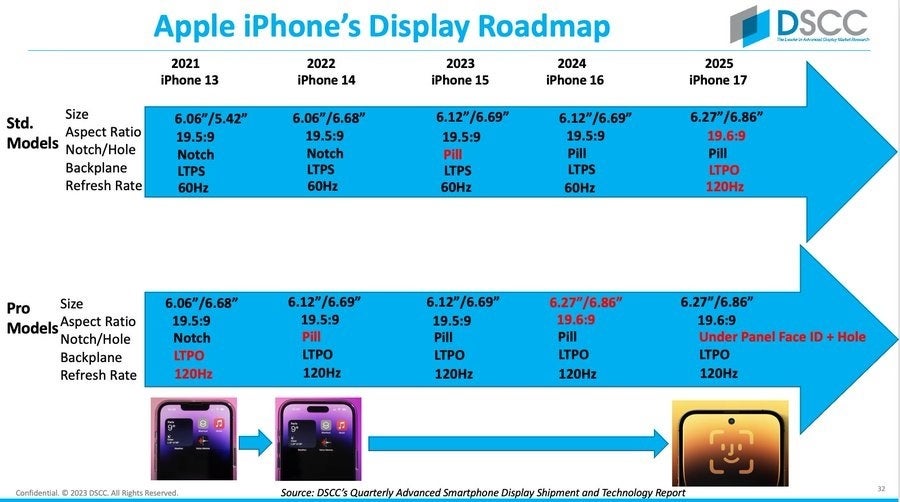
Considering the excitement that the Dynamic Island generated when it was a surprise introduction during the 2022 iPhone 14 series unveiling, the actual capabilities of the feature are underwhelming although there is still hope that Apple will be adding more functionality for the notch replacement.
In his tweet, Majin Bu points out that Apple has yet to decide exactly whether it will use a hole-punch cutout for next year's iPhone 16 Pro models. He also says that as far as he knows, the Dynamic Island could return on the iPhone 16 Pro and iPhone 16 Pro Max. Writing about the hole-punch being tested on the iPhone 16 Pro, the tipster says, "However I only said that they are testing that version but it is very unlikely to be released."
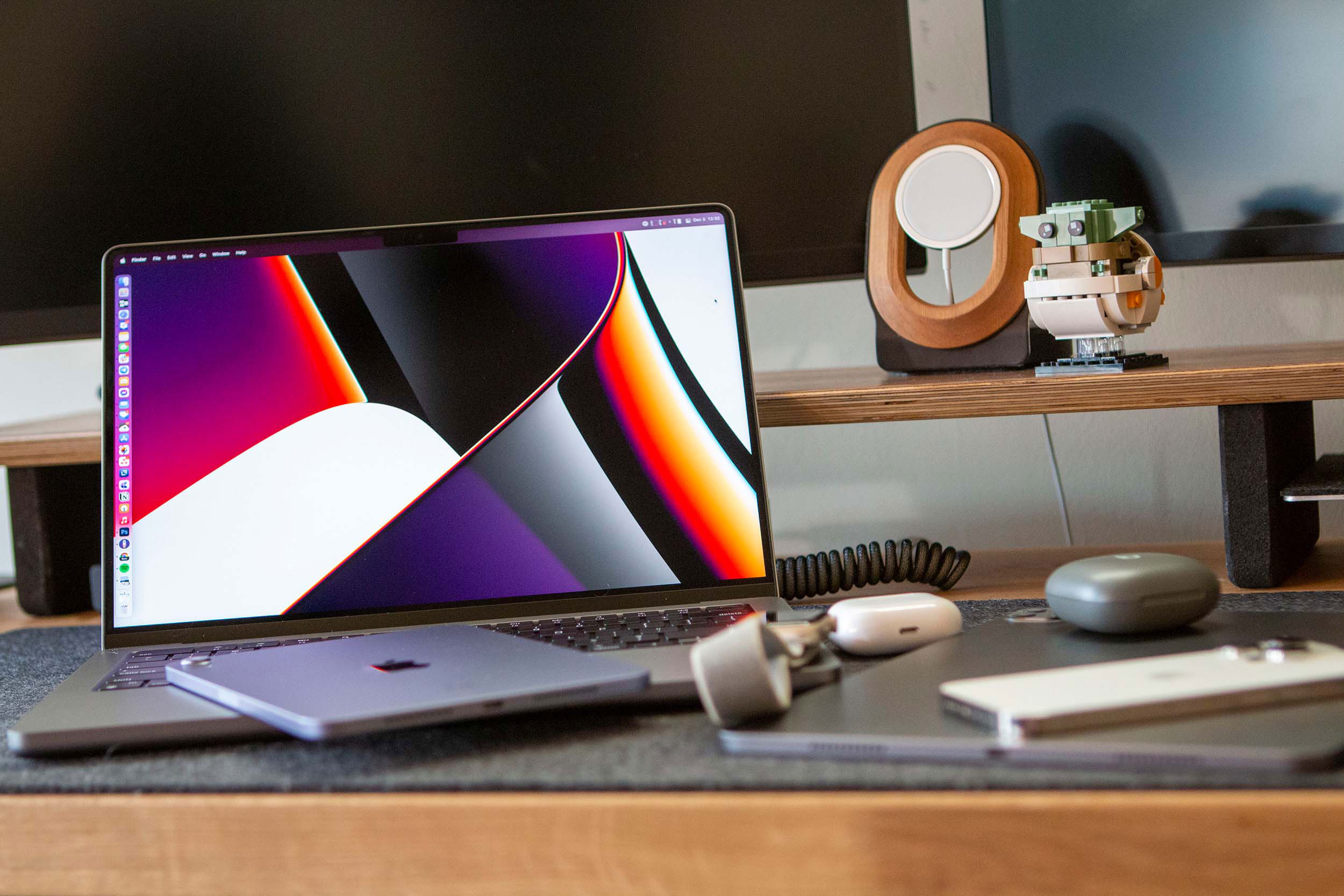
Last week, Apple sent out invites to a "Scary Fast" event that will be taking place on the 30th of October. While the company did not mention what we can expect, it has been speculated that it will be the announcement of the new M3 chipsets that will power Apple's Mac computers for the next year.
So, what can we expect from the new M3 chipset? According to Mark Gurman's Power On newsletter, we can look forward to three new chipsets - the M3, the M3 Pro, and the M3 Max, which shouldn't be surprising given Apple's past M-series launches.
According to Gurman, the base M3 chipset will most likely feature an octa-core CPU and 10-core GPU, which has a similar configuration as the M2, but will benefit from being faster. The M3 Pro could come in a couple of different configurations, like a 12-core CPU with an 18-core GPU, or a 14-core CPU and a 20-core GPU. As for the M3 Max, which will be the top-of-the-line option, it is expected to pack a 16-core CPU with a whopping 32-40-core GPU.
Apple has been dominating the chipset space when it comes to ARM-based chipsets for computers. Qualcomm did launch its new Snapdragon X Elite recently in which benchmarks suggests that it has caught up with the Apple M1, but it falls short compared to the M2, so if the improvements of the M3 are anything to go by, Apple is expected to maintain their lead for the foreseeable future.
© 2023 YouMobile Inc. All rights reserved






